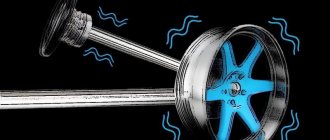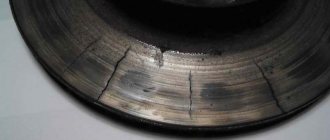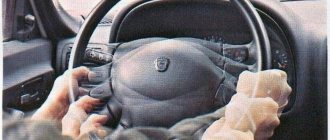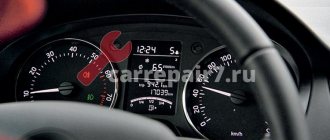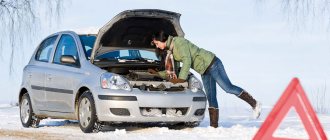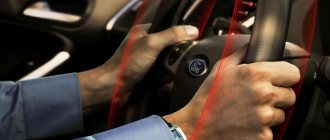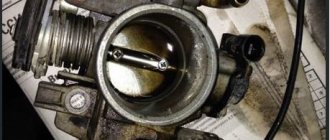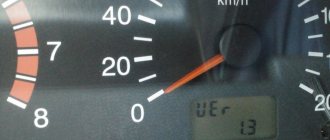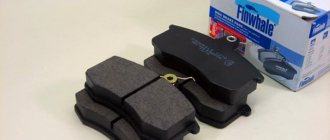Probably one of the most serious troubles in a car is a malfunction of the brake system. And if the brake pedal hits when braking, you need to take immediate action. Indeed, in the event of an emergency, the car may not react to the press in time, and an accident will occur. The driver may become frightened by these beats and reduce the force of pressing the pedal. The only thing worse than this situation is a complete failure of the brake system. These vibrations on the pedals can also be accompanied by feedback to the steering wheel. Let's figure out where these vibrations come from, what can hit the pedal, and how to solve this problem.
How to check if the brake pedal is beating?
To do this, you need to go to a dry, uniform surface. Of course, it is best if it is asphalt. To complete the picture, you need to disable ABS. If this is not possible, then try to drive in such a way that the system practically does not interfere with the braking process.
Then they accelerate to 80 km/h. They try to brake sharply without the wheels being locked. If the brake pedal hits when braking, then you should think about diagnostics and repair. If there are large vibrations on the steering wheel while reducing speed, it is necessary to reduce the pressure on the pedal and stop the car smoothly.
Typical reasons
This system in cars has a fairly simple structure. There are not many components in it that could fail and cause vibrations. Moreover, every detail can be the source of a problem.
Thus, discs, drums, air getting into the lines, worn calipers and hubs can cause shaking. Sometimes the cause is worn tires. Often a crooked wheel can transmit vibration to the steering wheel, but there will be no vibration to the brake pedal.
It's less common that the ABS is to blame. So, if it does not work correctly, unpleasant vibrations may occur. But it is easy to diagnose a system malfunction - the corresponding lamp on the instrument panel will light up. Let's look at why the brake pedal hits when braking.
Brake disk
The first and most popular reason, according to experienced car enthusiasts and service station technicians, is damaged or crooked brake discs. Most often they bend due to sudden temperature changes. During intense braking, the surface of the disc becomes very hot.
If you drive into a puddle at this moment, the metal will cool sharply. As a result, the discs become deformed. Because of this, the brake pedal hits when braking. A complete replacement of the disks will help solve this problem. They change on two wheels at once.
Often the problem of vibrations is observed after repairs. This will take some time - new parts need time to break in.
Ball joints
Experienced car enthusiasts recommend carefully checking the entire chassis.
For inspection, the car is jacked up, and the ball joint is installed so that the wheel hangs in the air. Then, with the palm of one hand, take the wheel by the upper part, and with the other hand, by the lower part. You need to wobble the wheel with your hands. If the wobble is present and felt, then the ball joint must be replaced. This should eliminate vibrations and knocking.
Corrosion
Cars are still made of metal, which is known to be susceptible to corrosion. Even if the car is parked in a warm garage, and it sits for a fairly long period of time, rust may form at the point of contact between the discs and the pads.
If the car is parked long enough, it is not surprising that the brake pedal hits when braking. VAZ and many imported cars are susceptible to this problem. This happens quite often. This effect may disappear over time. The disc needs time until the pad erases this layer of rust from the surface. There is no need to change or repair anything.
Drum
During braking, not only the front but also the rear brakes are used. On many modern cars they are still drum-type. This mechanism can also cause the brake pedal to squeal when braking. The VAZ-2114 is equipped with such brakes at the rear, and there really is a problem with them.
If the drum is deformed or damaged, the brake pedal will also vibrate. Sometimes the body shakes too. Often, along with the drum, the rear pads also fail. The vibration problem is solved by replacing these consumables. Replacement is carried out on all two wheels of the rear axle.
Why does the steering wheel vibrate when braking?
Before self-diagnosis, you should think about what preceded the appearance of the beating. Has the chassis system been repaired or brake pads replaced? It is worth starting to identify the breakdown with replaced parts. They may be made from low quality materials.
It is also important to consider the experience of the technician who performed the repair. Failure to comply with installation technology leads to increased loads
Not only the replaced part suffers, but also the system as a whole.
Did the steering wheel wobble after driving through puddles or fresh snow? Pay attention to the condition of the brake discs. Temperature changes lead to surface deformation
Does the steering wheel exhibit a large range of motion and become difficult to hold? With a 99% probability, the problem lies in broken brake discs or improper bleeding of the system. In such a situation, urgent repairs are necessary. The wheels react differently when you press the brake pedal. The likelihood of getting into an accident increases, and driving the car becomes uncomfortable even for an experienced driver.
The braking system is working properly, but there are vibrations
If, after checking all elements of the system, no serious damage or defects could be identified, then the problem may be hidden in non-obvious reasons. So, it could be:
- wheel imbalance;
- deformation of suspension arms;
- wheel bearing.
The reason may also be poor fastening of body elements and brake system parts. The car was driven on bad roads, and as a result, the brake pedal hits when braking. Niva is especially susceptible to these troubles. Perhaps a few bolts are not tightened somewhere, and the beating is felt on the pedal.
Is it possible to ignore the problem?
The braking system is one of the most important, since driving safety and the efficiency of stopping a vehicle directly depend on it. Any disruption to operation is extremely undesirable and it is not recommended to travel with them.
Some drivers ignore vibration, which later leads to more serious problems or even accidents as braking performance is reduced. And if this is not important under normal conditions, it is greatly manifested in an emergency situation.
If it is noticed that the operation of the system is disrupted, first of all make sure that everything is in order with the parts, there is no visible damage or leakage of brake fluid. After which you can continue driving, but it is advisable not to postpone your visit to the auto repair shop. If braking efficiency has decreased, it is better not to take risks, but to immediately begin repairs or contact a service center.
By the way!
When driving an automatic transmission, if vibration appears when the brake is pressed in the “D” gearbox position, first check the automatic transmission support cushions. If everything is in order with them, then the vibration sensor is diagnosed.
Balance imbalance
Often, neither a tire nor a rim is ideal both in its shape and in terms of geometry characteristics. Since the weight in different parts is different, during the rotation of the wheel, the place where the mass is greater will pull the central part of the wheel along with it. This is how centrifugal force works. If the wheel rotates quickly and the car is traveling at high speed, then this force will turn into vibration. This is the reason why the brake pedal and steering wheel hit when braking.
It is necessary to periodically balance the wheels. This procedure is especially relevant if the rims and tires have been replaced. Balancing is the equalization of the mass of a car wheel at each point. Special weights are attached to the reverse side.
If you drive on such wheels for a long time, the tire will wear unevenly, and this will lead to even greater vibrations. This also causes increased wear on car suspensions. The wheel bearing suffers the most from this.
The main symptom of imbalance is vibrations on the steering wheel. To diagnose this, the wheels are carefully inspected. If they are even, and the car did not drive through holes, then the problem lies precisely in the imbalance.
Don’t think that it’s enough to send one or two wheels for tire fitting and the problem will be solved. If you balance, then all four. Two won't do any good.
Continuation about clicks when braking. — Lada Granta, 1.6 l., 2013 on DRIVE2
So, in the last post I wrote that I observed slight knocking or clicking noises when braking lightly (from the rear). I'm writing about the continuation of the story...
And there wasn’t much of a continuation. I went and didn’t climb anywhere. I drove about 3 thousand km on vacation. I returned to work, and there my colleague told me how he changed the rear wheel bearings on his Priora (mileage 30 tkm, like mine) and after that he started... yes, yes, those same clicks when braking. Let me remind you that I also got them after an intervention (replacing the handbrake cables at the dealer under warranty). A colleague went to the service again, they took it apart, looked at it, and put it back together. The clicking seemed to go away, and then it started again...) He went for the 3rd time, again they didn’t find anything...)
Here I must say that by this time I had already FORGOT what was clicking in me! Those. My symptoms just went away or became very unnoticeable (I haven’t noticed them for several weeks now).
I still haven’t figured out the nature of the knocking, but it’s obvious that it appears after intervention (removing the drums or something else) and will most likely go away on its own and with my colleague (which I told him about).——
Added a month later The clicks appeared again. It’s a little annoying... I don’t want to climb. (although I may go to the dealer if they are clearly and constantly observed).
——
Recording another three months later.
There are no clicks. I forgot when they were... I didn’t do anything. I didn't remove the drums.
Mileage: 32000 km
www.drive2.ru
Warped tires or wheels
The cause of various vibrations can be crooked wheels. This is easy to identify on a balancing stand. More often, the wheel becomes deformed when it falls into a large hole. You can determine a crooked disk yourself. It is enough to visually inspect the wheel. Stamped discs are more susceptible to deformation.
A badly worn tire is also a common reason for the brake pedal to squeal when braking. The VAZ-2110 has a reliable design, but sometimes the cause of vibrations needs to be looked for here, rather than changing discs and pads. The cord on the tire may be damaged, causing part of it to become convex.
Sometimes the tires are simply defective. The symptoms will be simple - vibration on the brake pedal, on the steering wheel and throughout the body. The beating will intensify as the car accelerates. However, for the most part it depends on the degree of deformation of the wheel. With severe damage, beating will be felt even at low speeds.
It is impossible to solve the problem without replacing the wheels. Most often they have to be replaced, especially when the damage is serious. There is an option to ride with them after balancing. However, the vibrations will take a very long time to disappear until the tread becomes uniform on one side and the other.
No need to delay eliminating vibrations
Using a car with such symptoms is fraught with dire consequences. Due to vibrations, hub bearings, guides in calipers, and brake cylinders quickly wear out. Over time, you will have to change the steering rack and tips. And this is not the entire list.
Brake discs and drums can be machined. This will help return them to the desired shape. But we must remember that this is a last resort measure. If the disk thickness is minimal (less than 20 millimeters), only replacement will help. Otherwise, they will overheat even more. Don't skimp on spare parts. If a brake pad overheats, it is not a fact that it will not lose its properties. But often for this reason the brake pedal hits when braking. “Priora” is equipped with an anti-lock braking system “ABS”, and many owners say that it is the fault of the electronics that the pedal hits. But it’s better to check once again and identify defective parts.
Summarizing
The vibration of the brake pedal when braking is one of the symptoms of a malfunctioning brake system. The consequences can be very different from simple wear of parts to the creation of emergency situations due to brake failure.
For full operation of the brake system, full contact between the surface of the friction lining of the pad and the brake disc is necessary. If replacing worn parts helped only temporarily, maybe you should think about changing your driving style, because it is your driving style that affects the service life of the parts.
You should also not allow the temperature of heated elements (discs and calipers) to change; try to avoid puddles after braking, and also allow the brakes to cool before washing the car. To avoid breakdowns, you should visit service stations more often to check the performance and preventive maintenance of brake mechanisms, repair them in a timely manner, and also periodically inspect your brakes yourself.
You can test and find any faults in the brake system in your car on an empty section of the road, away from houses and pedestrians in order to avoid accidents.
First of all, you should carefully monitor the car’s braking process, listen to see if there are any extraneous noises or squeaks, whether the braking is uniform, or whether the direction of movement changes during sudden braking.
Probably one of the most serious troubles in a car is a malfunction of the brake system. And if the brake pedal hits when braking, you need to take immediate action. Indeed, in the event of an emergency, the car may not react to the press in time, and an accident will occur. The driver may become frightened by these beats and reduce the force of pressing the pedal. The only thing worse than this situation is a complete failure of the brake system. These vibrations on the pedals can also be accompanied by feedback to the steering wheel. Let's figure out where these vibrations come from, what can hit the pedal, and how to solve this problem.
